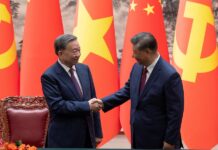Après le premier transfert de pouvoir pacifique de la Malaisie depuis son indépendance en 1957, la Fondation Kofi Annan et ses partenaires ont présenté cette semaine une feuille de route pour renforcer la démocratie et la réforme électorale en Malaisie.
Ce document contient 10 recommandations clés de la table ronde sur la réforme électorale, organisée en 2018 avec Bersih 2.0, Global Bersih, International IDEA et IFES, avec le soutien du président de la Chambre des représentants de Malaisie et de la commission électorale.
Téléchargez le rapport et lisez l’intégralité de la déclaration ici :
Ou retrouvez en anglaise la version intégrale ci-dessous:
On 9th May, 2018, Malaysia stunned the region and the world when a broad coalition of opposition parties won office, ushering in Malaysia’s first transfer of power since independence in 1957.
Malaysia’s experience shows us that politics cannot stand still in the face of changes brought by economic development, urbanization, and mass education. That experience also shows that it is possible to overcome the politics of identity and offer voters a credible democratic alternative; it also demonstrates that high voter participation can level the electoral playing field to deliver democratic change.
Despite this democratic achievement, we must not rest on our laurels. There are still pressing areas in our electoral laws and regulations that require attention and change. The outcome of our electoral reforms must not merely be to have clean, free, and fair elections, but also for Malaysia to become a robust multi-party democracy.
Goodwill alliance
On 30th November and 1st December 2018, the Kofi Annan Foundation, Bersih 2.0, Global Bersih, International IDEA and IFES, with the support of the Speaker of the House of Representatives of Malaysia and the Election Commission, held the Electoral Reform Roundtable at Parliament House, Kuala Lumpur. Local and international experts presented papers and held discussions on nine areas on electoral reforms and this Report that we are launching today is the outcome.
The Roundtable has been a key step in ushering in a New Malaysia that will be a real, vibrant, and sustainable multi-party democracy. There can no multi-party democracy without free, fair, and clean competition between political parties. Although we recognize the gigantic tasks that lie ahead of us in re-establishing multi-party democracy, and mindful of the need to avoid becoming lost in the euphoria of change, we are determined to identify and overcome the challenges that must be overcome to make political competition work.
List of recommendations from the Roundtable:
Consideration should be given to moving away from the first-past-the-post (FPTP) system towards a more proportional system that can promote national unity and centrism, allow for healthy competition between coalition partners, and better represent Malaysia’s diverse population in Parliament.
So long as Malaysia retains the FPTP system, it should address issues of over and under-representation both between the States of Malaya, as well as within each State. Constituencies should also be fairly and impartially drawn. Seats should be distributed between the States on the basis of electorate size, while strict numerical standards should be reinstated for variations between constituencies.
The electoral rolls should be audited and managed in an open, inclusive and transparent manner, so as to build public trust. A new geocoded National Address Database should be used to audit the electoral rolls and the civil registration records of the National Registration Department.
Absentee voting should be extended to Malaysian voters living in neighbouring countries as well as those living further afield. While absentee voting facilities should be provided for some domestic voters — in particular, East Malaysian voters in West Malaysia and vice versa — in the long run, voters should be encouraged to vote where they actually reside. Military and police voters should also be given the option of voting in their home constituencies via absentee voting.
Because of the difficulties of auditing electronic and online voting systems, and of securing public trust in such systems, careful investigations together with public consultations should be carried out before adopting any form of electronic and online voting in Malaysia.
While it should not be for government authorities to decide what is or is not “fake news”, the Election Commission and other authorities should play a role in monitoring political spending, electoral misconduct, and hate speech online.
The regulation of political spending must be extended to political parties and third parties, both during and outside the campaign period, and to internal party elections. Political contributions, both in cash and in kind, should also be declared and subject to limits. Public funding should take the place of some forms of private funding, and parties should have equitable and unrestricted access to state media.
Rules and guidelines
Rules and guidelines should be drawn up for managing transitions in government, codifying best practice and caretaker conventions. Consideration should also be given to a constitutional amendment submitting defecting Members of Parliament to re-election.
Election offences laws should be updated to clarify the roles and powers of the various state agencies and to empower the Election Commission to monitor, investigate, and penalize breaches of election offences laws.
The selection of Election Commissioners should be subject to scrutiny by a cross-party parliamentary committee, and the Election Commission should have operational independence in staffing and budgeting, subject to scrutiny by a dedicated parliamentary select committee. The Election Commission should be given responsibility for the registration and regulation of political parties, while consideration may be given to transferring responsibility for the delimitation of constituencies to an independent boundaries commission.
This Roundtable is the first platform to be held on strengthening multi-party democracy through electoral reforms. It must not, and will not, be the last. After the Roundtable, we hope that the conversation on electoral reform will continue in cities, towns, and villages nationwide, as well as in Parliament through a Parliamentary Select Committee to deliberate on and facilitate the constitutional and legal amendments necessary for electoral reforms.
We hope that this report, which draws together the views that have been expressed and the consensuses that have been reached during the Roundtable and is available in both English and Malay, will form the basis of these further conversations and deliberations.
Chaque semaine, recevez Gavroche Hebdo. Inscrivez vous en cliquant ici.












